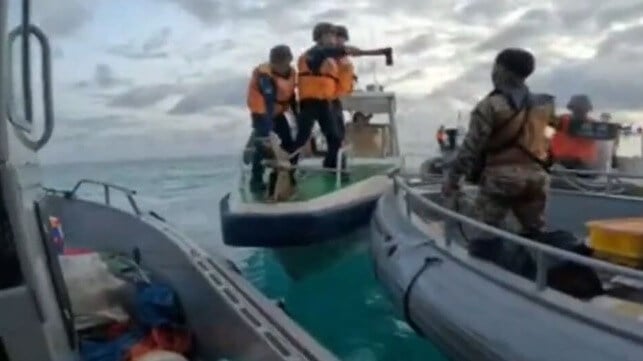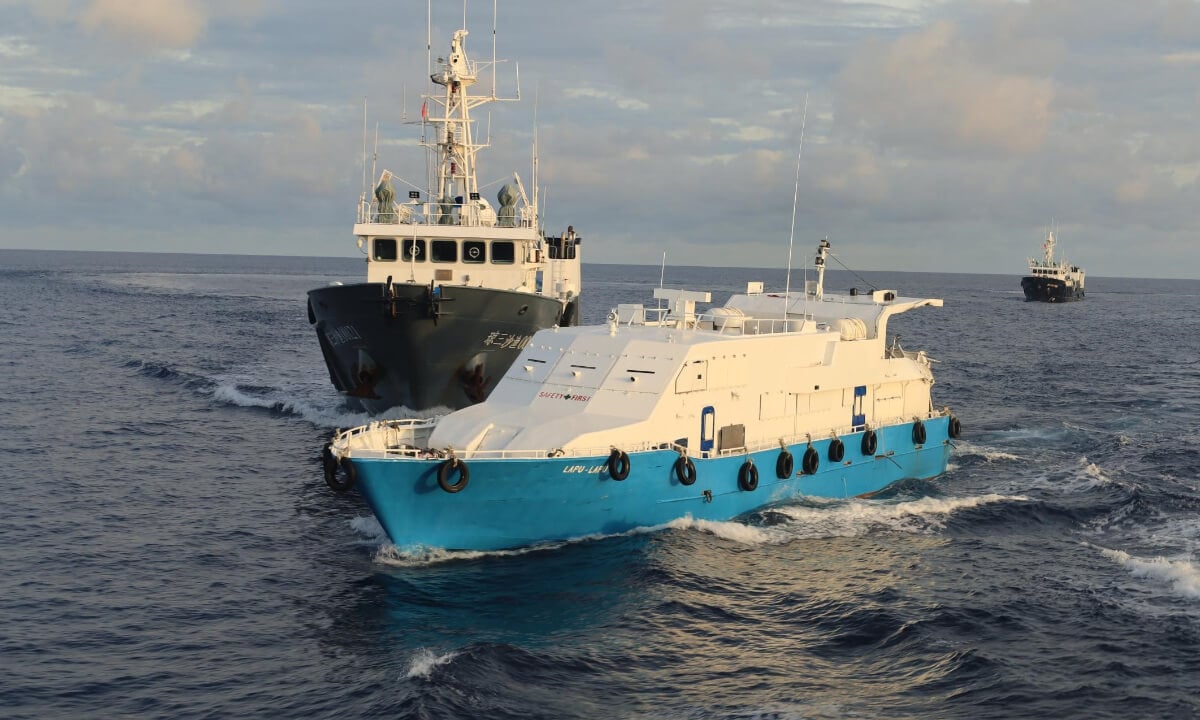Video Shows China Coast Guard Ramming and Threatening Philippine Soldiers

Two days after Chinese forces attacked a Philippine Navy resupply mission at Second Thomas Shoal, seriously injuring one Philippine servicemember, the first bystander footage of the altercation has emerged on social media. The imagery appears to depict the China Coast Guard employing much more aggressive tactics than in past encounters: in cell phone footage taken by Philippine personnel, Chinese servicemembers appear to repeatedly ram the two Philippine boats, forcibly remove their cargo, threaten the crew with axes and knives, and tow the vessels away.
"Hey, stop! This is our territory," A Filipino soldier shouted as China Coast Guard used physical force, weapons, sirens, and bright lights to prevent our AFP from delivering supplies during a humanitarian mission at BRP Sierra Madre in the Philippine EEZ on June 17th @gmanews pic.twitter.com/1THy7RhhxN
— JP Soriano (@jpsoriano) June 19, 2024
Newly-released photos also show damage to the Philippine Navy RHIBs, including smashed control systems on a helm console.
The imagery also shows - for the first time - that the altercation occurred within feet of the grounded landing ship BRP Sierra Madre, a Philippine military outpost manned by an armed garrison.
The CCG launched a brutal assault on the AFP personnel aboard an AFP Rigid Hull Inflatable Boat (RHIB), aggressively ramming it and brandishing bladed and pointed weapons, explicitly threatening to harm AFP troops. pic.twitter.com/LuFgLE3WJj
— Armed Forces of the Philippines (@TeamAFP) June 19, 2024
CCG personnel violently attached ropes to tow the AFP's RHIB while threatening to injure an AFP soldier w/ a pickaxe. They also employed blaring sirens to create chaos, disrupt communication, and divert the attention of AFP troops, exacerbating the hostile & dangerous situation. pic.twitter.com/a8cPaGGH8j
— Armed Forces of the Philippines (@TeamAFP) June 19, 2024
In the fray, a Philippine servicemember lost a thumb, two officials told AP on condition of anonymity. The officials acknowledged that the China Coast Guard towed off two Philippine Navy boats and seized or dumped the contents - including firearms. Philippine Navy forces later recovered the boats in damaged condition.
After the incident, the Philippines' defense and foreign affairs departments accused Chinese forces of "illegal and aggressive actions" at Second Thomas Shoal, including injuring personnel, damaging vessels, high-speed ramming, towing, and violating the UN Convention on the Law of the Sea. The Chinese government has denied any wrongdoing inside the Philippine exclusive economic zone, and has blamed the incident on Philippine forces.
"The People's Republic of China has once again attempted to provoke trouble in Ayungin Shoal. They clearly hope that the US will also be agitated to justify their false narrative that Washington really wants to go to war against Beijing," said Philippine Coast Guard spokesman Jay Tarriela, responding to Chinese claims.
Defense analysts have framed the newly-aggressive approach as an intentional strategy, designed not to achieve a tactical objective, but rather to determine just how far the Philippines and its Western allies will let China push.
"Make no mistake - this incident isn’t about who owns . . . Second Thomas Shoal," commented Australian maritime security expert Jennifer Parker. "This is very much about testing the new web of relationships in the region that are designed to deter China’s increased aggression."
Late Wednesday, the China Coast Guard released its own photos of the day's events, omitting the violent altercation next to BRP Sierra Madre. Through a state-owned media outlet, the CCG also published a photo of a previously-unknown Philippine supply vessel, which appears to have been armored to resist the CCG's water-cannon attacks.

that matters most
Get the latest maritime news delivered to your inbox daily.
 Image courtesy China Coast Guard (via state-owned media)
Image courtesy China Coast Guard (via state-owned media)
China claims the vast majority of the South China Sea as its own, including a large swathe of the Philippine exclusive economic zone. The Permanent Court of Arbitration in the Hague rejected China's sweeping claims in 2016, noting that Beijing's historically-derived assertions of sovereignty do not align with the UN Convention on the Law of the Sea. China has rejected the ruling and continues to insist that areas located hundreds of miles from the Chinese mainland - including features within the Philippine EEZ, like Second Thomas Shoal - belong to the Chinese government.
